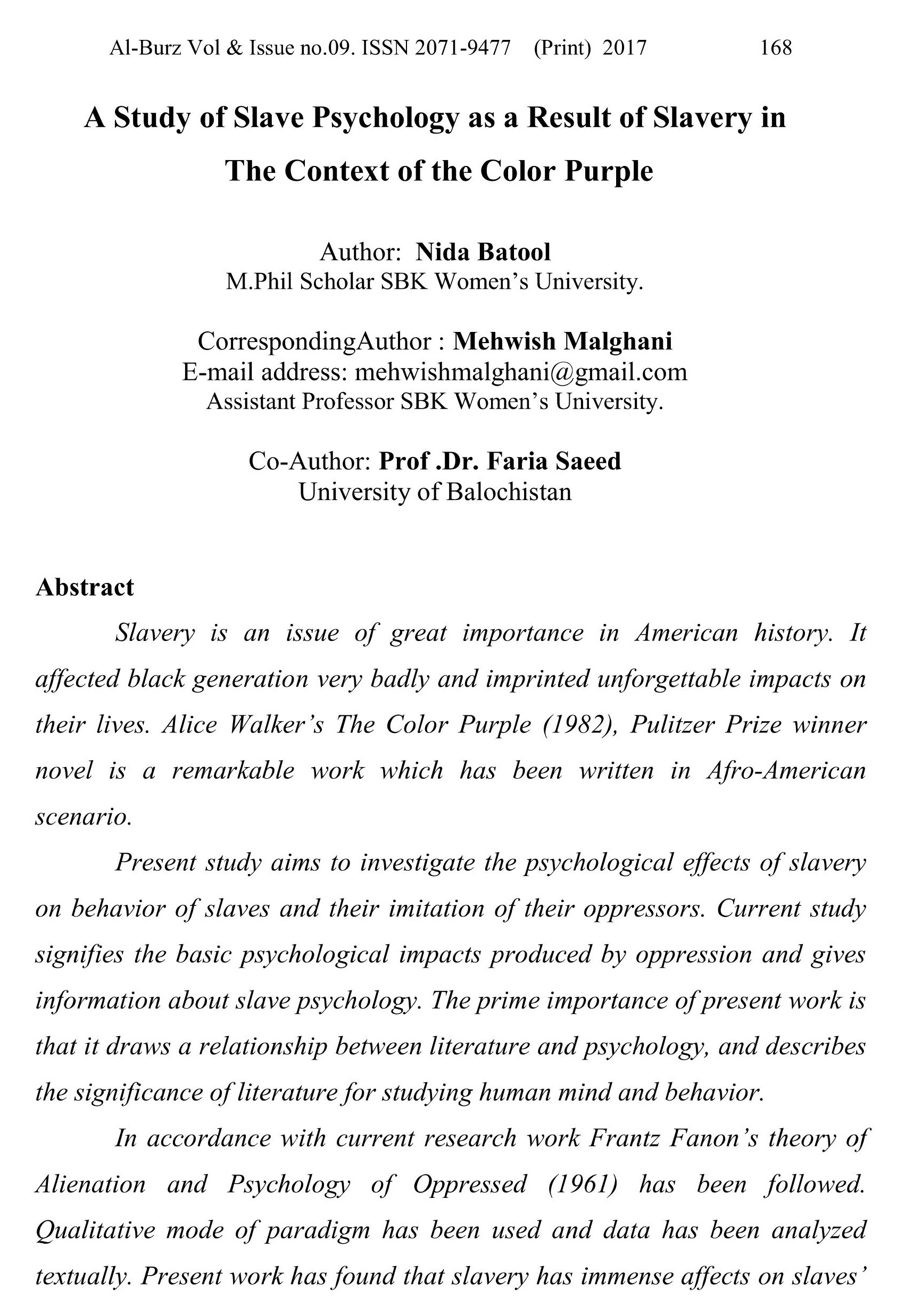A Study of Slave Psychology as a Result of Slavery in The Context of the Color Purple
DOI:
https://doi.org/10.54781/abz.v9i1.110Keywords:
Slavery, psychology, oppressed, behavior.Abstract
Slavery is an issue of great importance in American history. It affected black generation very badly and imprinted unforgettable impacts on their lives. Alice Walker’s The Color Purple (1982), Pulitzer Prize winner novel is a remarkable work which has been written in Afro-American scenario. Present study aims to investigate the psychological effects of slavery on behavior of slaves and their imitation of their oppressors. Current study signifies the basic psychological impacts produced by oppression and gives information about slave psychology. The prime importance of present work is that it draws a relationship between literature and psychology, and describes the significance of literature for studying human mind and behavior. In accordance with current research work Frantz Fanon’s theory of Alienation and Psychology of Oppressed (1961) has been followed. Qualitative mode of paradigm has been used and data has been analyzed textually. Present work has found that slavery has immense affects on slaves’ mind set. They unintentionally imitate their masters and try to become tyrant like them and show their violence towards weaker.
References
Amira, B. (2010). Celie's Emancipation Process in Alice Walker's" The Color Purple". Mentouri University, Constantine.
Bhuvaneswari, V. and Jacob, R. (2012). An Eco Feminist Study of Alice Walker's "The Color Purple". Research on Humanities and Social Sciences,2 (1).
Caute, D. (1970). Analysis of Frantz Fanon Theory of Alienation and Psychology of The Oppressed. Retrieved from, https://www.academia.edu
Creswell, J. W. (2013). Research design: Qualitative, quantitative, and mixed methods approaches. Sage publications.
Engels, F. (2011). Theory of origin of Patriarchy Property and State. University Press of the Pacific. Retrieved from, http://printage.wordpress.com/2011/08/04/friedrich-engeles-theory-of-the-origin-of-patriarchy
Fanon, F. (1961). The Wretched of The Earth.
Henson, J. (1876). Uncle Tom’s Story of His Life. An Autobiography of the Rev. Josiah. Retrieved from, http://blogs.it.vt.edu
Jackson, Melinda L. (1998). "The Color Purple" : Historical and Political Insight. Retrieved from, http://www.vms.utexas.edu/melinda.j/alice.htm.
Jinadu, A. (1986). FANON.In the search of the African Revolution. Retrieved from, http://www.academia.edu
Kaplan, E. (1999). Fanon, Trauma, Trauma and Cinema.USA: Routledge Publishers.
Onwuanibe, R. (1983). The Critique of Revolutionary Humanism. Frantz Fanon. Retrieved from, https://www.academia.com
Perinbam, B. M. (1983). Holy Violence : The Revolutionary Thoughts of Frantz Fanon, An Intellectual Biography. Retrieved from, https://www.academia.edu
Sartre, J. P. (1992). Note Book of Ethics . (D. Pellaur, Trans.) Chicago and London.
Walker, Alice. (1982). The Color Purple. Penguin Publishers:New York

Downloads
Published
How to Cite
Issue
Section
License
Copyright (c) 2017 Authors who publish with Al-Burz journal agree to the following terms: 1. Authors retain copyright and grant the journal right of first publication with the work simultaneously licensed under a Creative Commons Attribution (CC-BY) License that allows others to share the work with an acknowledgement of the work's authorship and initial publication in this journal. 2. Authors are able to enter into separate, additional contractual arrangements for the nonexclusive distribution of the journal's published version of the work (e.g., post it to an institutional repository or publish it in a book), with an acknowledgement of its initial publication in this journal.

This work is licensed under a Creative Commons Attribution-NonCommercial-ShareAlike 4.0 International License.
Alburz has licensed under a CC Attribution-NonCommercial-ShareAlike 4.0



